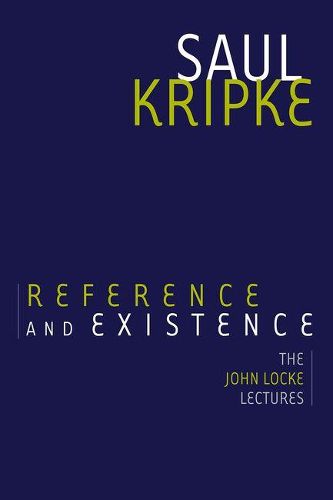Readings Newsletter
Become a Readings Member to make your shopping experience even easier.
Sign in or sign up for free!
You’re not far away from qualifying for FREE standard shipping within Australia
You’ve qualified for FREE standard shipping within Australia
The cart is loading…






Reference and Existence, Saul Kripke’s John Locke Lectures for 1973, can be read as a sequel to his classic Naming and Necessity. It confronts important issues left open in that work – among them, the semantics of proper names and natural kind terms as they occur in fiction and in myth; negative existential statements; the ontology of fiction and myth (whether it is true that fictional characters like Hamlet, or mythical kinds like bandersnatches, might have existed). In treating these questions, he makes a number of methodological observations that go beyond the framework of his earlier book – including the striking claim that fiction cannot provide a test for theories of reference and naming. In addition, these lectures provide a glimpse into the transition to the pragmatics of singular reference that dominated his influential paper, Speaker’s Reference and Semantic Reference – a paper that helped reorient linguistic and philosophical semantics. Some of the themes have been worked out in later writings by other philosophers – many influenced by typescripts of the lectures in circulation – but none have approached the careful, systematic treatment provided here. The virtuosity of Naming and Necessity – the colloquial ease of the tone, the dazzling, on-the-spot formulations, the logical structure of the overall view gradually emerging over the course of the lectures – is on display here as well.
$9.00 standard shipping within Australia
FREE standard shipping within Australia for orders over $100.00
Express & International shipping calculated at checkout
Reference and Existence, Saul Kripke’s John Locke Lectures for 1973, can be read as a sequel to his classic Naming and Necessity. It confronts important issues left open in that work – among them, the semantics of proper names and natural kind terms as they occur in fiction and in myth; negative existential statements; the ontology of fiction and myth (whether it is true that fictional characters like Hamlet, or mythical kinds like bandersnatches, might have existed). In treating these questions, he makes a number of methodological observations that go beyond the framework of his earlier book – including the striking claim that fiction cannot provide a test for theories of reference and naming. In addition, these lectures provide a glimpse into the transition to the pragmatics of singular reference that dominated his influential paper, Speaker’s Reference and Semantic Reference – a paper that helped reorient linguistic and philosophical semantics. Some of the themes have been worked out in later writings by other philosophers – many influenced by typescripts of the lectures in circulation – but none have approached the careful, systematic treatment provided here. The virtuosity of Naming and Necessity – the colloquial ease of the tone, the dazzling, on-the-spot formulations, the logical structure of the overall view gradually emerging over the course of the lectures – is on display here as well.